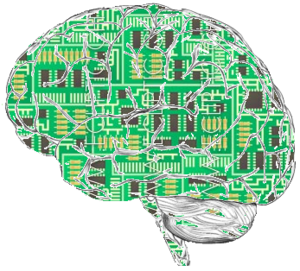"When our genes could not store all the information necessary for survival, we slowly invented brains. But then the time came, perhaps ten thousand years ago, when we needed to know more than could conveniently be contained in brains. So we learned to stockpile enormous quantities of information outside our bodies. We are the only species on the planet, so far as we know, to have invented a communal memory stored neither in our genes nor in our brains. The warehouse of that memory is called the library."I posit that the advancement of our (and every) species is defined by the limits of our memory. As we overcome the inherent design limitations of each type of memory, we move into a new Epoch of Memory, and a new level of complexity as both a society and a species.
-- "Persistence of Memory," Cosmos
Within Sagan's words we observe the first three Epochs of Memory. Like all species on Earth, we first solely stored memory genetically. Not just the memory of our biological selves, but whatever rote, instinctual behaviors that dominate our actions still today. Even viruses, which exhibit nothing so complex as "thought" or "intention" nonetheless possess a form of genetic memory that impels them to propagate. This was our First Epoch of Memory, when our genes made of us all that we could ever be. The design limitation of genetic memory was its dependence on mutation to spur advancement. All learning was random. Carried to its logical conclusion, the First Epoch led to a random mutation that improved our memory.
The Second Epoch saw the rise of brains, organs designed explicitly to deal with information. We (or, rather, our genetic forebearers) could now remember information and apply that memory long before the implications of that data became encoded in our genes. We need not wait for some random mutation to give us an advantageous instinctive aversion to chewing on hemlock leaves; we could now remember the illness we suffered after first consuming hemlock and, if we survived, choose not to eat it again. Many species developed brains and applied it to this explicit advantage.
Carried to its logical conclusion, the Second Epoch gave rise to language, a collection of symbols that could be remembered collectively by a group and used to communicate information not directly discerned by an individual. Now, if one member of the tribe learned not to eat hemlock, all the members of the tribe could benefit from that knowledge. The limitation of language was tied, initially, to the limitation of our physical memory. We could only remember so much, and the fidelity of that memory often suffered when it was transferred -- as in, told -- to another individual. The children's game of telephone is the classic exhibition of oral history's limitations.
Language, carried to its logical conclusion, gave rise to Third Epoch of Memory, a time when information could be stored outside the individual in tangible form. Books, for most of our history. Now, so long as you had the basic knowledge necessary to decipher the encoding language, you could benefit from the collective experience of the entire species. The limitation of external memory is organization and availability. We no longer carry information with us, but we must actively seek it out, and then apply it contextually.
Books, carried to their logical conclusion, now stand us on the precipice of the Fourth Epoch of Memory. In this Epoch, seeking out, organizing, and contextually applying information has been rendered an external process. Put more simply, the Fourth Epoch of Memory arrives when externally stored information is indistinguishable from internally stored information. What we know won't be limited to what we can remember, because we can access external memory (the Internet et al) with the same ease, speed, and faculty as internal memory (our brains).
A combination of high-speed mobile communications, augmented reality interfaces, and massive free, searchable libraries of information are only just now being born. But when this mass of external memory that we have spent centuries exponentially expanding is suddenly available in perfect context at the perfect moment for everyone, we will have become a fundamentally different species all over again. What we know will be limited only by our curiosity and our bandwidth speed.
I, for one, can't wait for the Fourth Epoch to arrive. As Jamais Cascio warns us, this era won't be without its drawbacks, but I think it will be well worth the price of admission. I only wish Carl had been here to see it.

